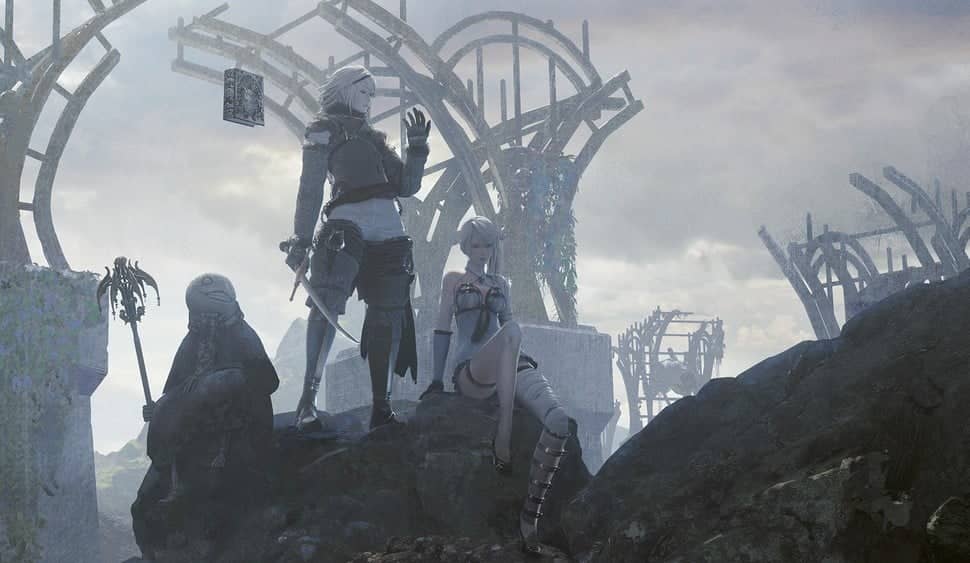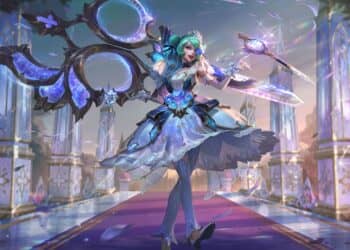This is a spoiler-free NieR Replicant ver 1.22474487139 review for PS4.
NieR Replicant ver 1.22474487139 is an unusual experience to say the least – it’ll regularly blow you away, but just as often leave you in a state of utter bemusement. Director Yoko Taro is eccentricity personified, and for all his unconventional methods, NieR Replicant’s best moments are a clear reminder of just how incredible video games can be as a storytelling medium.
Before we get into it, the title has a strange backstory that requires a short explanation. The original Nier was initially released in Japan in 2010 with two different versions – NieR Gestalt and NieR Replicant. They largely told an identical tale, but Gestalt featured an older man alongside his daughter, whereas Replicant told the story from the perspective of a brother.
In the West, around the same time, we simply got Nier. This was an English version of Gestalt, starring the father protagonist. Despite middling reviews, it garnered a cult following that celebrated the unusual storytelling, music and characters. Fast forward seven years and the critical acclaim of the exceptional sequel, NieR Automata, has finally encouraged the re-release of NieR Replicant. Gamers on Western shores will therefore get a chance to witness the story of brotherly love rather than fatherly protection for the first time.
This leads us onto the numbers, which aren’t random. 1.22474487139 is the square root of 1.5, depicting in a roundabout way the fact this is a sort-of remake-remaster-sequel hybrid. There are gameplay and graphical improvements, along with new playable sections and an exclusive true ending.
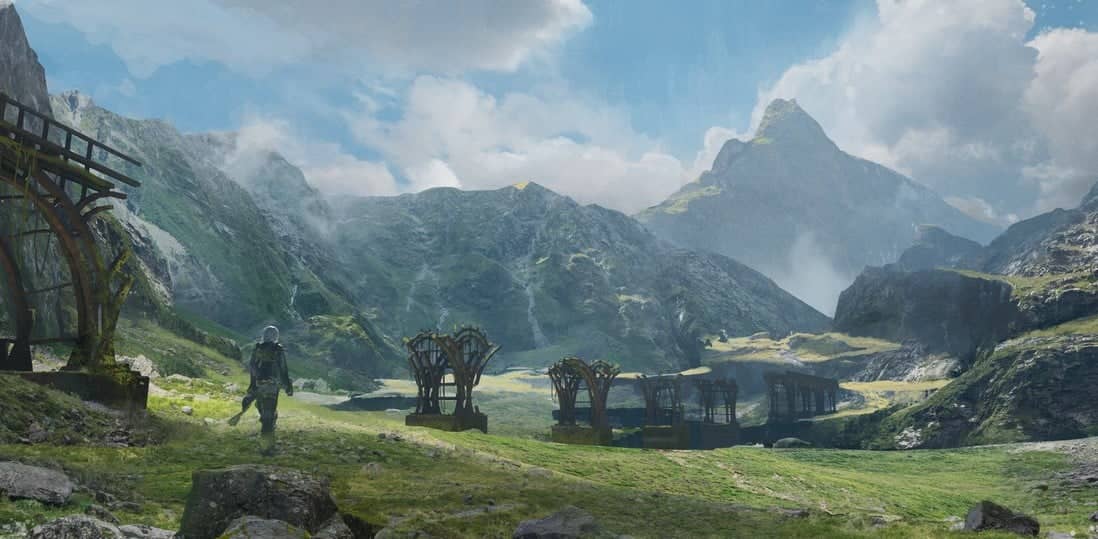
We start in a Last of Us-style post-apocalyptic scene where the protagonist, named by the player (many refer to him as Nier), fights off a horde of monsters closing in on his ill sister, Yonah. After this neat gameplay tutorial, we’re soon transported to an idyllic village via a large unexplained time jump. The world seems friendly and beautiful, instantly putting us at ease with the cosy home, lush grassland and serene music.
That is, until you actually spend some time in it.
As it turns out, NieR Replicant’s setting is a cruel, unforgiving place. It’s been taken over by mysterious creatures called shades, who range from tiny critters to colossal foes with the power to raze entire cities. Quests and story events more often than not end with a trail of dark truths, slaughtered corpses, or both.
Making matters worse, the protagonist’s sister is still unwell. Yonah is falling victim to a disease known as the black scrawl, draining her strength whilst causing mysterious markings to appear on her body. This is the main thrust of the plot, as the protagonist searches for a collection of spells known as the sealed verses which may just provide a cure to the disease.
NieR Replicant straddles a few genres, but at its heart it is a third-person action RPG. The protagonist smoothly slides back and forth, dodging, slashing and blocking as he battles shades, robots and wild animals on his journey. The combat is fluid and fun; quick and exhilarating. Despite moments where simple button-mashing will do the business, overall there’s enough skill involved to avoid it being a purely hack-and-slack affair.
New magic attacks and weapon types are unlocked as the story progresses, meaning players end up with a solid variety of different options. Light weapons offer more speed and less power than their heavier counterparts, whilst spells range from the light patter of rapid fire to summoning an enormous fist or a temporary shield.
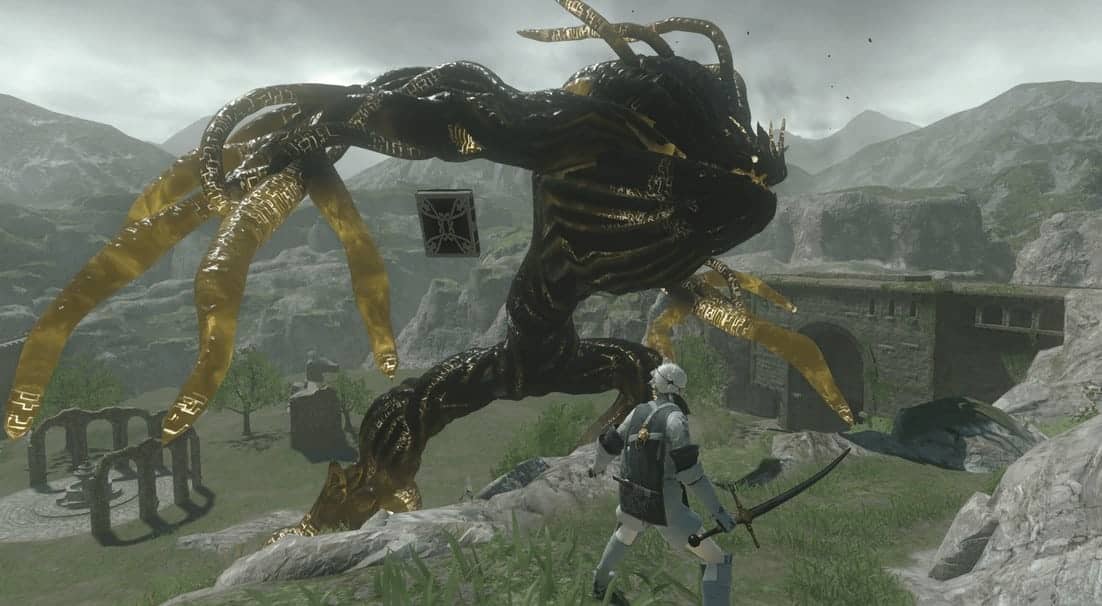
Your mettle is best tested in frequent bouts against waves of enemies where shades close in from every angle, gradually filling the screen as others pepper you with projectiles from afar. Picking them all off is satisfying, but never overly challenging on normal difficulty.
With all this going on there are also occasional shifts to the camera, flipping sections to birds-eye or side-on views. These are nice and fresh – also dropping in some platforming – and I’d have actually welcomed a bit more of this. Especially since the typical third-person camera can become awkward when switching between target enemies.
These gauntlet-style combat events are broken up by exploration and more typical dungeon crawling in areas surrounding the village. The nearby plains initially give the impression of a grand open world, but in actual fact it’s fairly modest in scale. You’ll get used to the same grassy paths, dry desert and ancient shrine (which is climbed so many times). The handful of towns don’t have a lot going on themselves, and the world is a bit light on detail overall.
On a brighter note, the soundtrack accompanying your excursions is utterly masterful. The best and most notable feature of the music is in the vocal performance of Emi Evans. Her songs are sung in a completely made-up language that somehow manages to perfectly capture the mood of each area and event. I’m not sure how she discovered this talent, but the product of her imagination is simply incredible. Whilst listening to the soundtrack on Youtube, I saw one particularly apt comment label it “The most beautiful gibberish you’ll ever hear”.
Another aspect deserving of glowing praise is the outstanding cast of characters. There isn’t exactly a plethora of people in the world, but the protagonist’s friends are bursting with so much personality between them that it doesn’t matter.
The first to join the main character’s adventure is a floating, talking tome named Grimoire Weiss. Weiss is arrogant and proud, dropping sarcastic remarks and thinly-veiled insults at everyone who dares shorten his name. It’s actually a little surprising how few NPCs seem to be alarmed by a magical book.
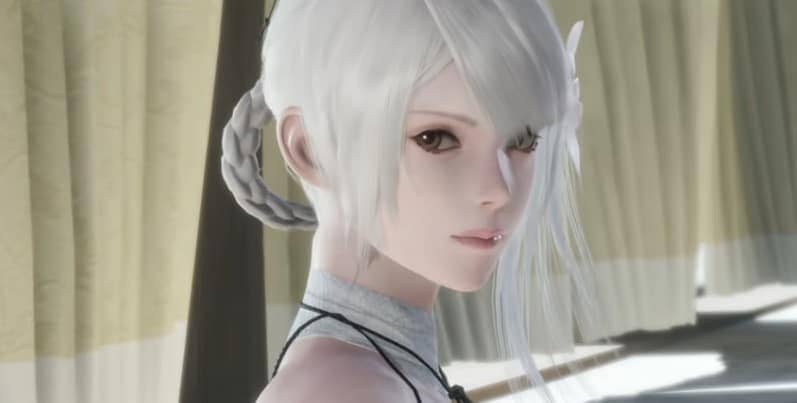
Next is Kainé, a scantily-clad lady whose fierce fighting style is matched only by her temper. She typically yells vulgar curses at her foes whilst brutally carving them open with dual blades. I defy anyone to conquer all of NieR Replicant’s content without growing to love Kainé’s character, which probably undergoes the most meaningful development of anyone. Her exchanges with Weiss, who scolds her foul mouth and dress sense, are a joy to behold, whether in the heat of dramatic cut-scenes or casual chatter during gameplay.
Finally, providing the perfect foil for the more headstrong companions is Emil. Despite a past filled with atrocity and sorrow, Emil is unfailingly kind. He is cursed with the unwanted ability to turn anyone he looks upon into stone, leading him to wear a blindfold. Like Kainé, his tragic backstory is filled in piece by piece, and you can’t help but feel huge warmth and sympathy for him.
The reality is that the protagonist is by far the least interesting character among the main cast. He’s a generic do-gooder, which results in plenty of ribbing from Weiss when he takes on any task within earshot, no matter how mundane. Yonah, the sickly sister, isn’t any better, acting more as a plot device than a three-dimension character.
Thankfully, the more time the protagonist spends with the rest, the more they rub off on him. The foursome ultimately enjoy such terrific chemistry that the only issue I had was simply that there wasn’t enough of it. All too often, general exchanges are restricted to a few lines, and perhaps a bit more optional character-driven filler to flesh the relationships out further would have been welcome.
The story is bound together by numerous boss fights and significant plot events that invariably offer magnificent, grand spectacles. Characters are pushed to their limits against the scintillating musical score, switched from melancholic calm to more dynamic, hair-raising melodies that will get you on the edge of your seat time and time again.
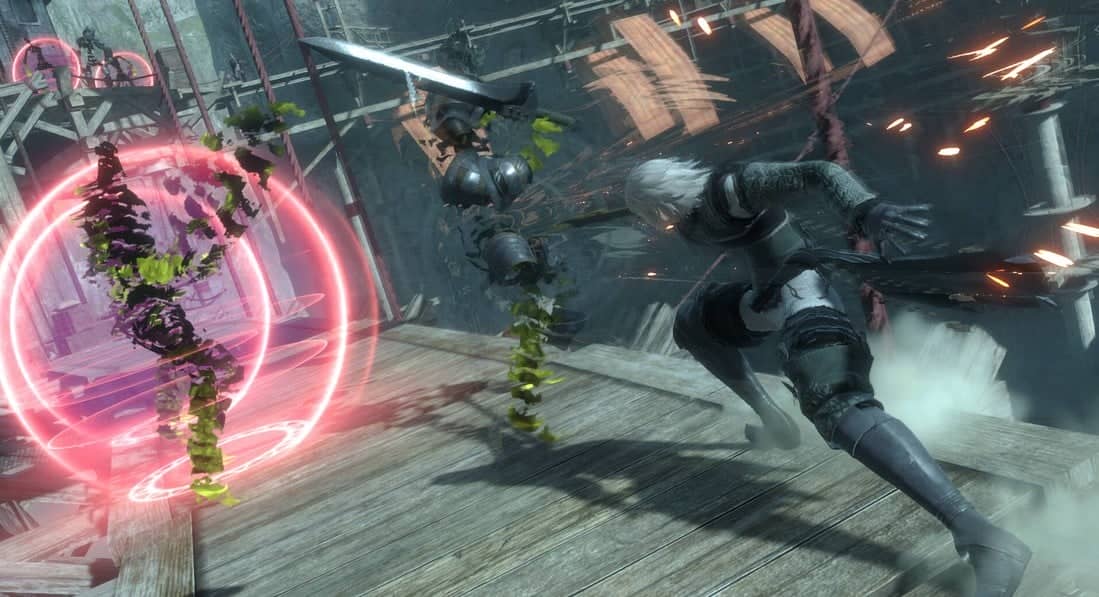
This is NieR Replicant at its best, but in between the threads that bind these narrative landmarks together are thin, with even the mandatory plot involving fetch quests with a disproportionate amount of backtracking. Sometimes you literally need to run to a town, only to be told to run back to the previous town, and back again after speaking to one person in each.
There are a lot of loading screens and a half-soaked fast travel system that makes the bread-and-butter gameplay rather arduous at times. That’s not even mentioning the optional sidequests, which are often dull hunts for an arbitrary number of collectibles dropped by enemies or scavenged on the field. These sort of monotonous sidequests are a frequent RPG bugbear of mine, and I only wish they’d been swapped for a few character-driven side stories, which would have given me the additional party interaction I craved whilst trimming the fat off sections I had to force myself through.
Some other creative decisions are equally hard to fathom, like arbitrarily removing the ability to sprint and dodge in a fairly long inner-mansion section which was frustrating even before enemies started turning up. Furthermore, some significant plot revelations are experienced via massive text-based exposition dumps. These are told in well-written passages, but felt like a missed opportunity. Given the excellent standard of the set pieces and cut-scenes that are included, I couldn’t help wondering how much better these parts would be had they been similarly brought to life.
With these issues in mind, NieR Replicant ends up falling below NieR Automata, which is undoubtedly the title many will have played first. However, I should put this criticism into context by saying that NieR Automata is probably my game of the generation. Failing to hit its heights is no disgrace. NieR Replicant is set some time before Automata, meaning some plot twists will be far easier for NieR Automata players to guess, but rest assured it won’t spoil the experience. There are still more than enough mysteries to keep you on your toes.
NieR Replicant is so unique that I don’t want to delve much further into it, lest I ruin any surprises. I’ll therefore conclude with the small handful of things I think you really do need to know before starting out. The first is that if you are playing this story for the first time, even if you played NieR Automata first, you should avoid spoilers at all costs. Yes, this can be said of any story, but with revelations aplenty there is no doubt your mind will be blown over and over again.
Secondly, be aware that there are multiple endings, and unlocking them all will require a significant amount of replaying the same sections. The second playthrough has some additional cut-scenes and dialogue that put previously-witnessed events into an entirely different perspective. I’ll say no more.
I genuinely really dig the bizarre storytelling methods, but you have to go through a large portion of the game at least three times to unlock the grand conclusion, which felt like once too many to me. However, this leads to the final and most important point – it can’t be understated how much you have to reach Ending E. Doing any less will sell yourself short of one of the most superb conclusions in or outside of gaming (we actually have a full spoiler-free endings guide here).
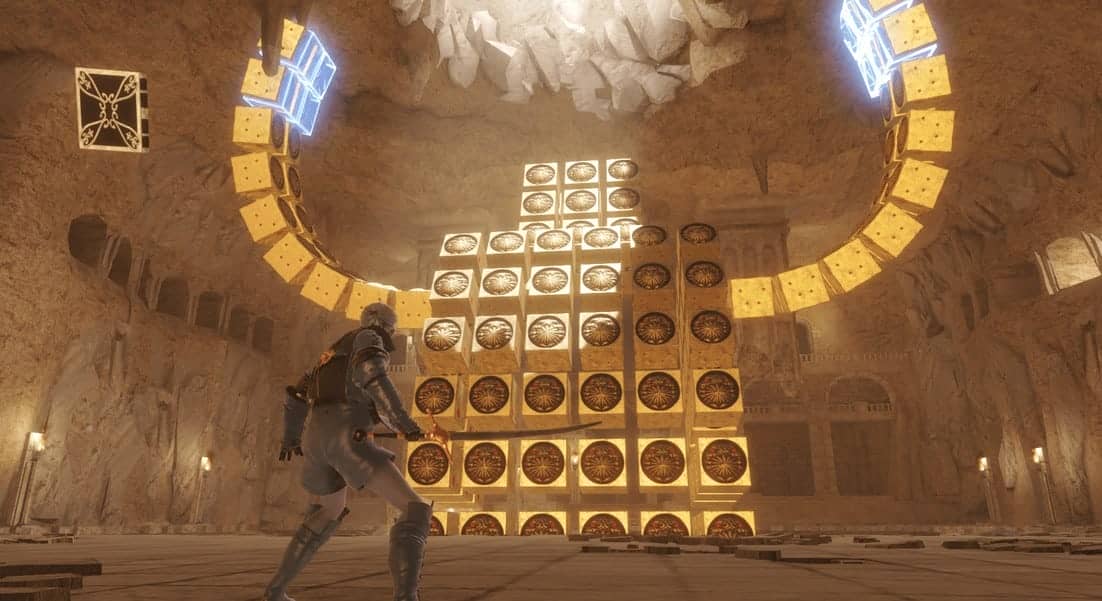
It’s like a trek up a mountain whose final hours are spent arduously hiking up steep, repetitive pathways. The journey is not quick or easy, but the view from the summit is jaw-dropping, leaving you in no doubt that it was all worth it. Don’t turn back, or put it off – just get on with it.
The inclusion of NieR Automata’s soundtrack can also ease the monotony of repeat playthroughs. Once completing Ending A, the music can be switched over on a subsequent playthrough from the title screen. Anyone should relish the opportunity to absorb another wonderful collection of music, again capitalising on Evans’ stunning but incomprehensible lyrics.
It’s also fair to say that a third playthrough can be whizzed through in a couple of hours – you carry over your levels and equipment and by now, you’ll know the beaten path off by heart. Reaching the grand finale (along with all other endings) can be done well under 40 hours – especially if you forgo the tedious sidequests.
When you finally get there, expect something special. Ending E, which in itself came after NieR Replicant’s best hour of gameplay, left me stunned, moved and speechless. I basked in its brilliance for some time after the credits, before concluding that this twisting, turning, unusual ride should be experienced by everyone.
It’s not perfect by any means, but this bonkers, thought-provoking tale is most definitely a work of genius.
NieR Replicant ver 1.22474487139 is available here.

